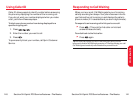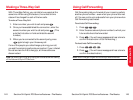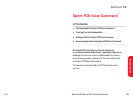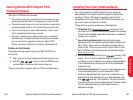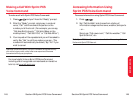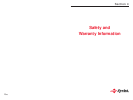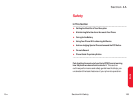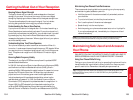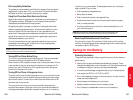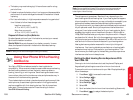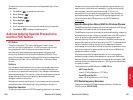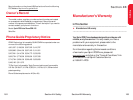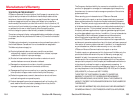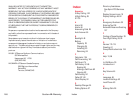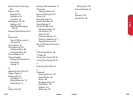
Section 4A: Safety 157
in bodily injury or even death. These areas are often, but not always,
clearly marked. They include:
ⅷ
Fueling areas such as gas stations.
ⅷ
Below deck on boats.
ⅷ
Fuel or chemical transfer or storage facilities.
ⅷ
Areas where the air contains chemicals or particles such as grain,
dust, or metal powders.
ⅷ
Any other area where you would normally be advised to turn off
your vehicle’s engine.
Note: Never transport or store flammable gas, liquid or explosives in the
compartment of your vehicle that contains your phone or accessories.
Restricting Children’s Access to Your Phone
Your phone is not a toy. Do not allow children to play with it as they
could hurt themselves and others, damage the phone or make calls that
increase your Sprint PCS Invoice.
Caring for the Battery
Protecting Your Battery
The guidelines listed below help you get the most out of your battery’s
performance.
ⅷ
Use only Sprint-approved batteries and desktop chargers. These
chargers are designed to maximize battery life. Using other batteries
or chargers voids your warranty and may cause damage.
ⅷ
In order to avoid damage, charge the battery only in temperatures
that range from 32º F to 113º F (0º C to 45º C).
ⅷ
Don’t use the battery charger in direct sunlight or in high humidity
areas, such as the bathroom.
ⅷ
Never dispose of the battery by incineration.
ⅷ
Keep the metal contacts on top of the battery clean.
ⅷ
Don’t attempt to disassemble or short-circuit the battery.
Safety
156 Section 4A: Safety
Following Safety Guidelines
To operate your phone safely and efficiently, always follow any special
regulations in a given area. Turn your phone off in areas where use is
forbidden or when it may cause interference or danger.
Using Your Phone Near Other Electronic Devices
Most modern electronic equipment is shielded from radiofrequency
(RF) signals. However, RF signals from wireless phones may affect
inadequately shielded electronic equipment.
RF signals may affect improperly installed or inadequately shielded
electronic operating systems and/or entertainment systems in motor
vehicles. Check with the manufacturer or their representative to
determine if these systems are adequately shielded from external RF
signals. Also check with the manufacturer regarding any equipment
that has been added to your vehicle.
Consult the manufacturer of any personal medical devices, such as
pacemakers and hearing aids, to determine if they are adequately
shielded from external RF signals.
Note: Always turn off the phone in health care facilities and request permission
before using the phone near medical equipment.
Turning Off Your Phone Before Flying
Turn off your phone before boarding any aircraft. To prevent possible
interference with aircraft systems, the U.S. Federal Aviation
Administration (FAA) regulations require you to have permission from a
crew member to use your phone while the plane is on the ground. To
prevent any risk of interference, FCC regulations prohibit using your
phone while the plane is in the air.
Turning Off Your Phone in Dangerous Areas
To avoid interfering with blasting operations, turn your phone off when
in a blasting area or in other areas with signs indicating two-way radios
should be turned off. Construction crews often use remote-control RF
devices to set off explosives.
Turn your phone off when you're in any area that has a potentially
explosive atmosphere. Although it's rare, your phone and accessories
could generate sparks. Sparks can cause an explosion or fire, resulting



